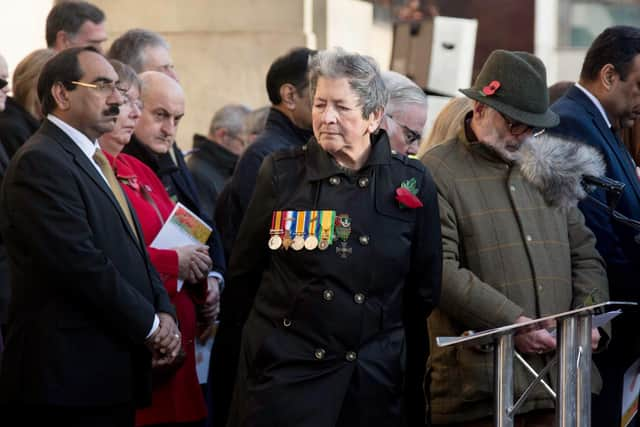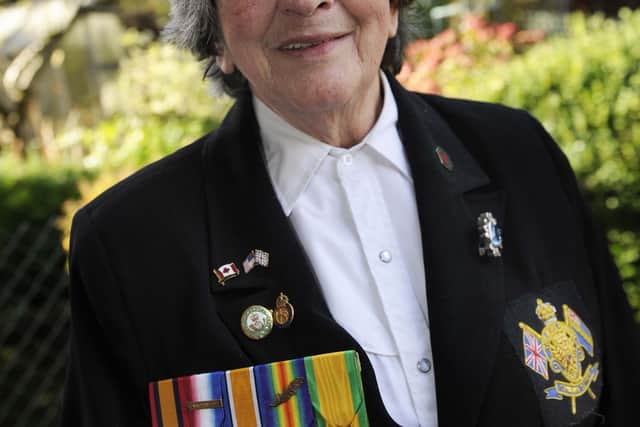Sheffield's longest serving member of the Royal British Legion recalls her memories of the Falklands conflict
and live on Freeview channel 276
Pat Davey, of Owlthorpe, was a Sheffield councillor at the time of the conflict and was working as a property management agent.
She was born during the Blitz in the Second World War and has been a member of the Royal British Legion for over 65 years.
Advertisement
Hide AdAdvertisement
Hide AdLooking back on 1982, Pat said: “At that time I was deputy leader of the conservative group on the city council – as well as spokesman on education and spokesman for the British Legion and ex-service people in Sheffield for the council as there was no one else to speak for them.”


Pat recalled some of the events leading up to the conflict, with Argentine “scrap dealers” landing and raising the country’s flag on the island of South Georgia.
She said: “I think with hindsight that those scrap dealers were little more than scrap dealers, and they were trying it on."
Pat recalls how the Government was busily trying to plan and bring about a peaceful outcome.
Advertisement
Hide AdAdvertisement
Hide Ad“The British Government was desperately trying to make preparations for what might come, and trying to negotiate,” she said.


Pat remembers the early stages of the war, and the first enemy contact with British forces based in Port Stanley.
“I think it was on April 2 1982 the Argentine actually landed a force of men on to the main island, they took the Governor, a chap called Hunt, prisoner.”
She recalls the small number of Royal Marines who fought bravely to repel the invasion.
Advertisement
Hide AdAdvertisement
Hide Ad“The Royal Marines – not many of them, I think the figure was 60 – fought a running battle, but we didn’t stand a chance against the Argentine superior numbers.
“The Falklands islanders were appealing for help, and Britain as usual – Little Britain – came to the aid of them.
“And within days we were sending ships, soldiers and airmen across the Atlantic to the Falklands Islands.”
Pat comes from a long line of servicemen serving in several wars over the centuries.
Advertisement
Hide AdAdvertisement
Hide AdShe initially believed that no-one from her family had any involvement in the conflict.
Pat said: “For the first time in 200 years I thought none of my family were involved, but in actual fact a cousin on my mum’s side was in charge of the refuelling of our planes on the way to the Islands, and during the war.
“So my family was involved, although at the time, and until recently, I didn’t know it.”
On May 4 1982 HMS Sheffield was hit by an Exocet missile, killing 20 crew members – forever connecting the city’s name with the conflict.
Advertisement
Hide AdAdvertisement
Hide AdPat says the feeling of the people of Sheffield at the time was difficult to gauge.
“Sheffield wasn’t a military-charged city at that time, but I think the feeling was, we are British, we fight best when our backs are to the wall, and we never give in.
“I think the thing was there, we had right on our side.
“The people in the Falklands had said time and time again, ‘We wish to remain under British control’. We were fighting for the freedom for a small number of people.
"We did what we do best, we stuck at it, and even though the losses were heavy, considering the number of people we were defending, I think on the whole most people were very proud of what we did.
Advertisement
Hide AdAdvertisement
Hide Ad“There was obviously a lot of sympathy, there always is – quite rightly – for those men who had lost their lives, and this is something we should never forget.
“Those men offered to give their lives for the freedom of this country and other people around the world.”When the conflict was finally over Pat says there was thankfulness in Sheffield.
“People were relieved that it was finished, they were pleased that it had finished, and it had been finished correctly, and the people who we were fighting for were back in charge of their own lives and able to live as they wanted under the British Crown.”
Everyone has a right to their opinion in a democracy, and views and opinions vary.
Advertisement
Hide AdAdvertisement
Hide AdPat said: “Some people didn’t think it was right to go to war, that’s their opinion, but we did what was right, what was hoped of us, and was expected of us.”
Events commemorating the anniversary of the conflict, in which 255 British troops and 649 from Argentina died, along with three civilian Falkland Islanders, are planned across the Britain and in the Falklands, where Margaret Thatcher Day is celebrated on January 10 each year.
And Pat added that Armed Forces Day in June would be a time to look back.
“The thing I will say, speaking into the hat of the Joint Council of ex-service, as chairman of the joint council and as far as ex-service people are concerned, this year’s Armed Forces Day will celebrate and commemorate the men who fought and particularly those who died.
Advertisement
Hide AdAdvertisement
Hide Ad“I hope people agree with that, I think most of them will,” she said.
“All the ex-service people will, I know because I’ve spoken to a lot, but I hope the people will, because I think we need to bring it home to them that we defend those people that put their trust in us even though they’re 8,000 miles away.”